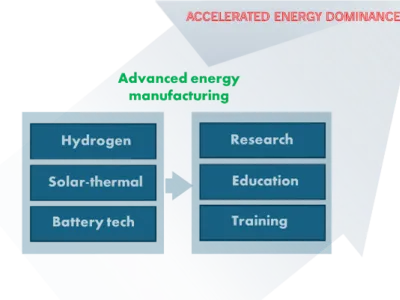WILSONVILLE, OR - Thanks to Oregon Institute of Technology (Oregon Tech) and local company KersTech Vehicle Systems, those noisy garbage trucks rolling through your neighborhood early in the morning might soon come with a mute button. Not literally, but if the high-tech partners have their way, not only will garbage trucks make substantially less noise, but city buses could haul folks farther on the dime of cash-strapped municipalities.
"We're working on the brains of this technology right now," says KersTech CEO Lester Erlston. "This kind of technology requires very clever controller programming, and that’s where Oregon Tech comes in."
KersTech has a patent pending on an electric-hydraulic compound motor that increases efficiency 25 to 30 percent. With Oregon Tech’s help, reductions in waste will be even higher. The new motor will offer greater energy efficiency than conventional electric motors, particularly in heavy vehicles that have frequent start-and-stop drive cycles, such as the electric buses and garbage trucks that will travel our roads in the not-too-distant future.
An average city bus gets 4.5 miles per gallon and consumes around 8,000 gallons of fuel per year, while a garbage truck gets three miles per gallon, which means it uses roughly 8,600 gallons each year. Electric city buses and garbage trucks would use no diesel at all, only electricity, and KersTech’s new motor technology would use less electricity and require smaller, less expensive batteries or offer more driving range. TriMet – who, along with local company Pride Disposal, already has an agreement with KersTech – could save more than four million gallons of fuel a year with a fleet of electric buses. A further benefit of electric buses and trucks would be drastically reduced city and neighborhood noise levels. Electric motors are almost silent compared to diesel engines.
"It gives us a practical problem space where we can apply the type of engineering theory that students learn in our courses," says Oregon Tech professor James Long. "Oregon Tech is a very hands-on university. The current struggle in higher education is to create courses that are immediately relevant. We’re able to create a cutting edge classroom experience that’s also on the cutting edge of this new technology."
Oregon Tech's work with KersTech will focus on combining an electric motor with a hydraulic motor to find the speeds at which each functions most efficiently. The complex mathematics that Oregon Tech is applying to the problem will result in a controller that efficiently switches between the two motors to maintain a minimum of energy waste.
The collaboration between KersTech and Oregon Tech was made possible by a grant in the amount of $139,173 by National Institute for Technology and Communities (NITC), a part of the Oregon Transportation Research and Education Consortium (OTREC). OTREC is a national University Transportation Center and a partnership between Oregon State University, Oregon Tech, Portland State University, and the University of Oregon.
About Oregon Tech
Founded in Klamath Falls in 1947, Oregon Institute of Technology is one of seven institutions in the Oregon University System, and the only public institute of technology in the Pacific Northwest. Oregon Tech provides degree programs in engineering and health technologies, management, communication, and applied sciences that prepare students to be effective participants in their professional, public, and international communities through hands-on learning. Oregon Tech has a main campus in Klamath Falls and a second main campus located in Wilsonville, 18 miles from downtown Portland. The Oregon Tech Wilsonville Campus is designed to provide an industry-focused urban educational experience at the heart of Silicon Forest. The university also has sites in West Portland, Salem, La Grande, and Seattle, as well as online degree offerings. Visit www.oit.edu to learn more about Oregon Institute of Technology.









